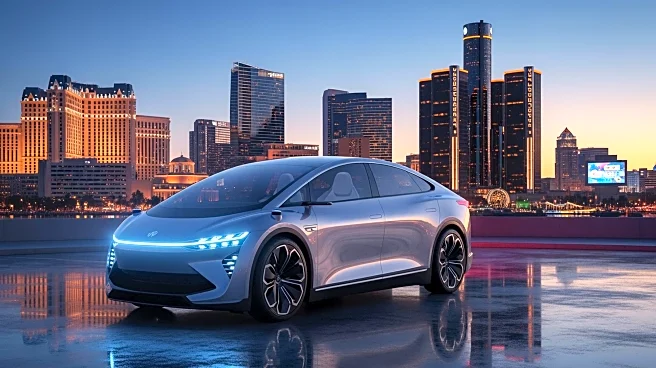What's Happening?
Waymo LLC has announced the expansion of its autonomous ride-hailing service to three new U.S. cities: Las Vegas, San Diego, and Detroit. The company has begun operations in these cities with a fleet of Jaguar I-PACE and Zeekr RT vehicles equipped with its sixth-generation
Waymo Driver technology. While Waymo plans to start serving riders in San Diego next year and in Las Vegas by the summer of 2026, no specific timeline has been provided for Detroit. This expansion follows Waymo's recent announcement of plans to introduce its robotaxi services in London by 2026, with further international ambitions in Tokyo. In the U.S., Waymo's autonomous vehicles have already covered over 100 million miles and provided more than 10 million rides, with current operations in Phoenix, San Francisco, Los Angeles, and Austin.
Why It's Important?
The expansion of Waymo's robotaxi service into new cities marks a significant step in the broader adoption of autonomous vehicle technology in the U.S. This move could potentially transform urban mobility by offering a reliable and efficient alternative to traditional transportation methods. The introduction of autonomous vehicles in diverse environments, including those with challenging weather conditions like Detroit, could accelerate the development and acceptance of self-driving technology. This expansion also positions Waymo as a leader in the autonomous vehicle industry, potentially influencing regulatory frameworks and public perception. The success of these services could lead to increased investment in autonomous technology and infrastructure, benefiting tech companies and urban planners while posing challenges to traditional taxi and ride-sharing services.
What's Next?
Waymo's continued expansion into new markets is likely to prompt responses from competitors and regulatory bodies. As the company plans to introduce services in additional cities like Miami, Atlanta, and Nashville, stakeholders will closely monitor the integration of autonomous vehicles into existing transportation systems. Regulatory agencies may need to adapt policies to accommodate the growing presence of self-driving cars, ensuring safety and efficiency. Additionally, public acceptance and trust in autonomous technology will be crucial for the success of these services. Waymo's ability to navigate diverse urban environments and weather conditions will be tested, potentially setting benchmarks for the industry.
Beyond the Headlines
Waymo's expansion into cities with varying climates, such as Detroit, highlights the company's efforts to adapt its technology to different environmental conditions. The ability to operate in snowy and icy conditions could set Waymo apart from competitors and open new markets previously considered challenging for autonomous vehicles. This development also raises questions about the future of urban transportation infrastructure and the role of autonomous vehicles in reducing traffic congestion and emissions. As Waymo continues to innovate, ethical considerations regarding data privacy and the impact on employment in the transportation sector will need to be addressed.















